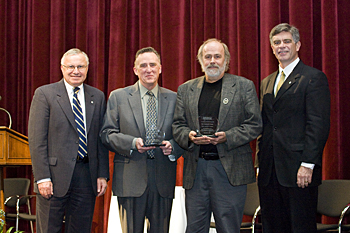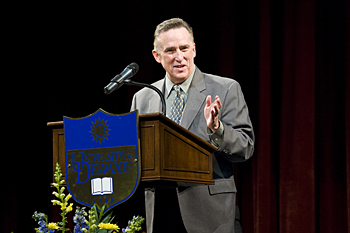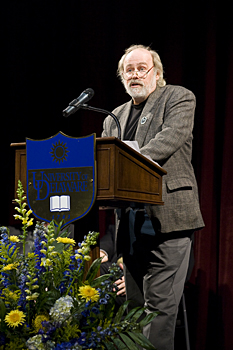
“On behalf of the entire University of Delaware community, I want both of you to know that we are extremely, extremely proud of your work in this significant field, of your many contributions that have added greatly to the body of knowledge concerning climate change and your accomplishments,” said UD President Patrick Harker.
IPCC, a science body advising the United Nations on the dangers of global warming, was established in 1988 by the World Meteorological Organization (WMO) and the United Nations Environment Programme (UNEP) in recognition of the problem of potential global climate change.
Byrne is a contributing author to Working Group III, which made contributions to the fourth assessment report, produced special reports on aviation, emission scenarios, technology transfer, ozone and climate, carbon dioxide capture and storage, as well as the third assessment report.
Nelson contributed a lengthy section on climate-change impacts on permafrost to the 2007 IPCC report in the panel's Working Group I and Working Group II.
“So, why the Peace Prize for the IPCC?” Byrne asked during the ceremony. “I have no good answer for that, but I do like the answer provided by Wangari Maathai, she is the 2004 winner of the Nobel Peace Prize for her leadership in shepherding the Green Belt Movement in East Africa. She said in her congratulatory note to the IPCC: 'The climate change problem, if unsolved, will create the single biggest threat to world peace we have ever faced.'”

“It brings a great deal of satisfaction to have been able to play a modest role in a project that is regarded so positively and to know that society recognizes that our collective efforts are both worthwhile and useful,” Nelson said. “It's a sobering and, in a very real sense, a humbling experience to be able to work with the caliber of scientists involved in an enterprise with the importance and the visibility of IPCC.”
In addition to his work with IPCC, Byrne is coexecutive director of the Joint Institute for a Sustainable Energy and Environmental Future, cofounder of the International Solar Cities Initiative, policy adviser to the Environmental Forum of the Korea National Assembly and a member of the board of directors of the Urban Environmental Center. He was instrumental in obtaining United Nations observer status for CEEP related to the Framework Convention on Climate Change.
Byrne received his bachelor's degree in economics and his master's and doctoral degrees in urban affairs and public policy from UD. He was named director of UD's Energy Policy Research Group in 1981 and was appointed an assistant professor in urban affairs and public policy in 1982. He has received UD's Excellence in Teaching Award.
Byrne also created UD's graduate program in energy and environmental policy, the first such doctoral degree offered in the U.S. He was a Fulbright senior lecturer/researcher in 1995, jointly affiliated with Seoul National University and the Korea Energy Economics Institute.
Byrne has published extensively in his field and is coeditor of the Bulletin of Science, Technology and Society and general editor of Energy and Environmental Policy book series. His most recent books are Energy Revolution and Environmental Justice.
Nelson received an honors bachelor of science degree in geography from Northern Michigan University in 1973, and went on to earn master's and doctoral degrees in geography from Michigan State and the University of Michigan, respectively. He served as assistant through full professor of geography at Rutgers University from 1986 through 1993, and has held positions as visiting professor of geology and physical geography at the University of Michigan and Cornell University.Nelson was named Honorary Fellow in the Department of Geography at the University of Wisconsin-Madison for 1990-91, and served as professor of geography and geological sciences at SUNY-Albany from 1994 to 1997. Nelson, who was recently designated “Distinguished Alumnus” by his alma mater, Northern Michigan University, the highest honor bestowed by that University, has been professor of geography at UD since fall 1997.
Nelson has published seven monographs and edited volumes and more than 110 peer-reviewed papers in scientific journals. During 2002-04 he cochaired a task force on the impacts of climate change on permafrost and civil infrastructure for the U.S. Arctic Research Commission, a group of scientists, engineers and other leaders appointed by the U.S. president. Since 2003 Nelson and UD Research Associate Nikolay Shiklomanov have directed the Circumpolar Active Layer Monitoring (CALM) program, an international global-change monitoring program that oversees 168 permafrost observatories in both polar regions and selected mid-latitude mountain regions. Nelson has garnered more than $5 million to support his research, mostly from the National Science Foundation.
Article by Martin Mbugua
Photos by Kevin Quinlan

